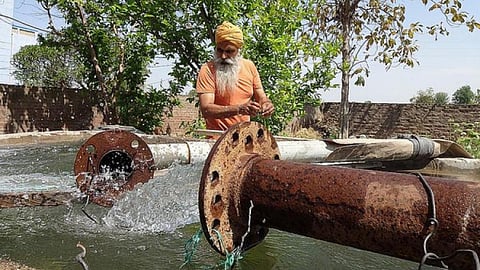
- Topics
- Feature
- Opportunities & Events
- Data
- Hindi Portal
- Topics
- Feature
- Opportunities & Events
- Data
- Hindi Portal

A number of aggressive and unsustainable agricultural practices have been found to lead to severe groundwater depletion in India. For example, the Indo-Gangetic plains in northwest India are undergoing severe groundwater depletion due to excessive and inefficient use of water in agriculture. And no where is this more evident than in the state of Punjab, the food bowl of India!
The paper titled 'Can crop diversification be widely adopted to solve the water crisis in Punjab?" published in Current Science informs that groundwater depletion has reached alarming levels in Punjab, a pioneer of green revolution in India. While Punjab continued to grow a diverse variety of crops before the green revolution, this was rapidly replaced by paddy–wheat cultivation post the green revolution.
The area under paddy in the state has increased rapidly, from 0.39 million ha in 1970–1971 to 3.1 million ha in 2018–2019 thus leading to dangerous levels of groundwater exploitation due to water guzzling paddy and inefficient irrigation practices.
The situation has turned so precarious that aquifers in about 79 percent of the total area of Punjab are now overexploited. Of the total 138 development blocks the state, groundwater has been found to be overexploited in 109 blocks, critical in 2 blocks and semi-critical in 5 blocks. The average depth of the water table has decreased from 7.32 m in 1998 to 12.79 m in 2012 with a depletion rate of 0.37 m/yr.
This trend will not only adversely affect agricultural productivity in the state, but also threaten the food security of India as Punjab’s agriculture has the largest contribution to India’s food stock.
Crop diversification, that aims at replacing water guzzling paddy- cultivated on over 85 percent of the cropped land with less water-intensive crops, is being proposed as a strategy to overcome the groundwater crisis in Punjab.
Crop diversification can lead to several benefits like conservation of groundwater, revitalisation of soil leading to improved productivity and efficient use of resources, strengthening of the rural sector by increasing employment opportunities and ecological gains through sustainable agricultural practices. However, many farmers in Punjab are reluctant to adopt it.
Experts argue that
this has to do with the agricultural policies adopted by both the State and Central Governments in Punjab.
For example, the current policies on minimum support price (MSP) and assured procurement, free electricity, easy and subsidised purchase of submersible pumps and fertilisers serve to encourage wheat and paddy cropping while alternative crops lack price and procurement support.
On the contrary, alternative crops, especially fruits and vegetables, require large cold storage facilities. Farmers see no profit in growing alternative crops and making effort to have storage facilities for alternative crops under these circumstances.
Also,
However, experts suggest that adoption of crop diversification among a large number of farmers who have landholdings of more than 2 ha in the state, can greatly help in encouraging water saving practices and prevent groundwater depletion.
Effective policies that would ensure fixing of commercially remunerative MSP for alternative crops; creating marketing infrastructure; strengthening market information and intelligence; increasing public and private investment in rural infrastructure; research and extension services and provision of credit assurance and risk insurance for alternative crops can go a long way in changing the current situation in Punjab, argues the paper.